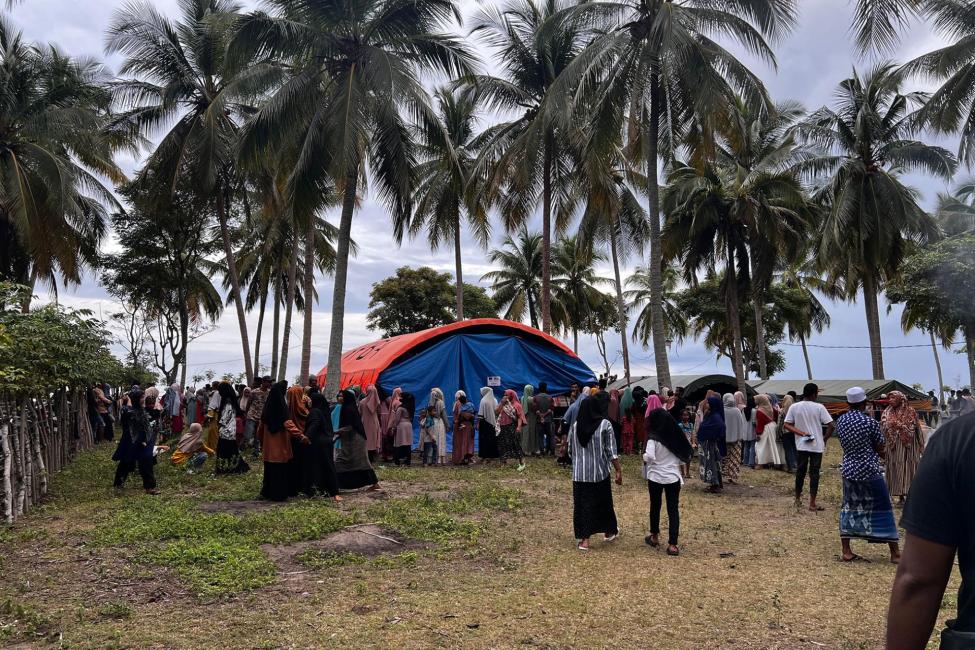-
Who we are
WHO WE AREThe International Organization for Migration (IOM) is part of the United Nations System as the leading inter-governmental organization promoting since 1951 humane and orderly migration for the benefit of all, with 175 member states and a presence in over 100 countries. IOM joined the United Nations system in September 2016.
About
About
IOM Global
IOM Global
-
Our Work
Our WorkAs the leading inter-governmental organization promoting humane and orderly migration, IOM plays a key role to support the achievement of the 2030 Agenda through different areas of intervention that connect both humanitarian assistance and sustainable development.
Cross-cutting (Global)
Cross-cutting (Global)
- Data and Resources
- Take Action
- 2030 Agenda
Common Ground needed on Clear, Equitable Pandemic Travel Measures
 |
 |
New York - Two years after the global pandemic brought cross-border mobility to a stand-still, it is time for the international community to agree on pandemic travel measures that are clear, equitable, streamlined and future-focused.
A side-event today coordinated by the International Organization for Migration and the Migration Policy Institute in partnership with the World Health Organization, governmental and non-governmental partners as part of the International Migration Review Forum (IMRF) heard that a course must be charted that balances health security with predictable cross-border mobility.
Despite dramatically different contexts for migration and mobility, participants agreed that there is a need to harmonize approaches, as well as build out the digital and physical infrastructure of border management and invest in capacity-building.
IOM Director General António Vitorino, MPI President Andrew Selee, and several participants voiced their support for the creation of a Member State-led Group of Friends to discuss cross-border mobility and pandemic preparedness, to complement and support the ongoing review of the International Health Regulations, and Member State negotiations towards a new pandemic treaty.
“Without this common endeavour, there is an increasing risk that future migration will become even more fragmented, accentuating the already evident signs of a two-speed recovery from COVID-19 that leaves less developed countries behind,” said DG Vitorino.
“This, in turn, will stall future economic and social development that could otherwise be accelerated through well-managed migration.”
“While there is an overall trend towards re-opening for travel, this process continues to be highly uneven, unequal, and uncoordinated,” said President Selee. “We lack common standards for requirements like testing, common tools to prove vaccination status across borders, and a common understanding of what works to manage public health risks at the border.”
This side-event took place on the margins of the IMRF, held under the auspices of the General Assembly at the United Nations (UN) Headquarters in New York. The IMRF is taking stock of progress towards implementing the Global Compact for Safe, Orderly and Regular Migration (GCM), supported by the UN Network on Migration, of which IOM is the Coordinator.
Maintaining predictable and safe cross-border mobility, and ensuring pandemic preparedness, is core to the successful implementation of the GCM objectives, as expressed in the Secretary General’s Second Report on the GCM.
About the International Organization for Migration
Established in 1951, IOM is the leading intergovernmental organization in the field of migration and works closely with governmental, intergovernmental and non-governmental partners. With 174 member states, a further eight states holding observer status and offices in over 100 countries, IOM is dedicated to promoting humane and orderly migration for the benefit of all. It does so by providing services and advice to governments and migrants. Learn more about IOM: www.iom.int.
About the Migration Policy Institute
A nonpartisan organization, MPI seeks to improve immigration and integration policies through authoritative research and analysis, opportunities for learning and dialogue, and the development of new ideas to address complex policy questions. Founded in 2001, MPI provides analysis, development and evaluation of migration and refugee policies at local, national and international levels. It aims to meet the rising demand for pragmatic and thoughtful responses to the challenges and opportunities that large-scale migration, whether voluntary or forced, presents to communities and institutions in an increasingly integrated world. For more on MPI, visit www.migrationpolicy.org.
***
For more information, please contact:
IOM: Paul Dillon, +41 79 636 98 74, pdillon@iom.int
MPI: Yoseph Hamid, +1 202 266 1930, yhamid@migrationpolicy.org

